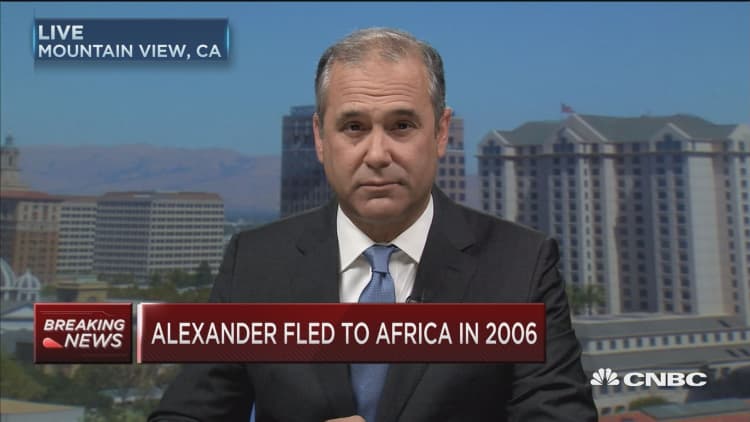
Former Comverse Technology Chairman and CEO Jacob "Kobi" Alexander, who refused to return from Africa after being indicted in a wide-ranging stock option scandal a decade ago, has agreed to return to the U.S. to face charges, CNBC has learned.
Alexander will plead guilty Wednesday to a one-count superseding indictment, according to his New York-based criminal attorney, Benjamin Brafman, bringing to a close one of the last remaining cases of the dot-com era.
The agreement is the product of more than two years of sensitive negotiations among the Justice Department, Alexander's attorneys, and government authorities in Namibia, where Alexander, 64, has been living since 2006 while fighting extradition to the U.S. He was scheduled to appear before a Namibian judge on Monday morning to end the proceedings there and clear the way for his return to New York.
A spokesperson for the U.S. Attorney's office in Brooklyn, which brought the original indictment, declined to comment.
A federal grand jury indicted Alexander in 2006 on 35 counts for allegedly masterminding a 15-year scheme to manipulate the value of millions of dollars worth of Comverse options.
He is also accused of money laundering after moving millions of dollars to personal accounts in his native Israel, as well as bribery and witness tampering for attempting to persuade the company's chief financial officer to take the fall for the scandal.
Comverse, a darling of Wall Street during the tech boom, pioneered the development of voicemail. But after the bubble burst, the company was among the first to be targeted in a sweeping federal investigation of options fraud. Two top executives pleaded guilty.
Comverse Technology survived until 2013, when it was bought out by a former subsidiary, Verint Systems.
Escape to Africa
With his own indictment looming in 2006, Alexander moved to Namibia, which had no extradition treaty with the United States. CNBC tracked him there in 2007, and found him living in a gated community on the grounds of the Windhoek Country Club. His luxury townhouse was adjacent to a private airstrip, even though a Namibian judge had restricted his travel and Alexander theoretically faced certain arrest if he left the country.
By then, Alexander had pledged millions of dollars — lavish by Namibian standards — in aid to Namibian schoolchildren and new housing for the nation's impoverished townships. Alexander and his wife also set up a pair of soup kitchens in the country, credited by local media with feeding hundreds of children every day.
Attorneys in the U.S. accused Alexander of using Comverse shareholder money to buy off the Namibian government, which his Namibian attorney flatly denied.
"He is entitled to be here, he is entitled to participate in the economy, and I think anybody who has that sort of idea, it is a machination of their own means and making," Richard Metcalfe told CNBC in 2007.
Nonetheless, extradition proceedings in Namibian courts dragged on for years, with most hearings postponed or canceled. Alexander has remained in Namibia long after his fellow former executives got out of prison, reportedly flying in 200 guests for his son's bar mitzvah in 2008.
Coming to Terms
But Alexander did not ignore his looming legal problems in the U.S. He eventually settled multiple lawsuits brought by Comverse shareholders. He also agreed to pay $60 million to the company he founded, and dropped his countersuit for $72 million in severance.
In 2010, he settled with the Securities and Exchange Commission for more than $53 million, in what the agency billed as one of the largest settlements ever in an options back-dating case.
But the criminal case against him remained the final loose end, complicated by the notoriously slow wheels of justice in Namibia, and the fact that dot-com era options backdating cases brought by the previous administration were not exactly a top priority in the U.S. Justice Department.
"Notwithstanding his departure from Namibia, Mr. Alexander and his family will continue their charitable work in Namibia," Brafman said in a statement. "Specifically, since 2007, the Alexander family has financed and operated soup kitchens in Namibia that have served more than 750,000 nutritious meals to children in Katutura and Kuisebmond. These soup kitchens will continue to operate, employing seven people and feeding 700 children each day."
Correction: This story was revised to correct that Alexander lived in Africa after being indicted. He moved there before he was indicted in the U.S.


